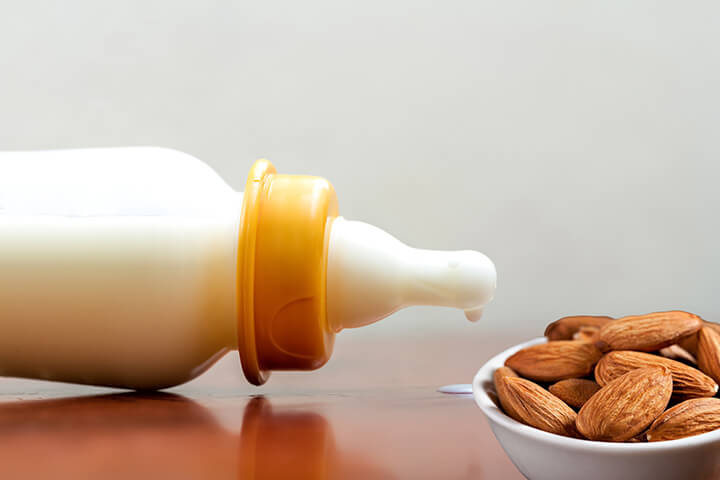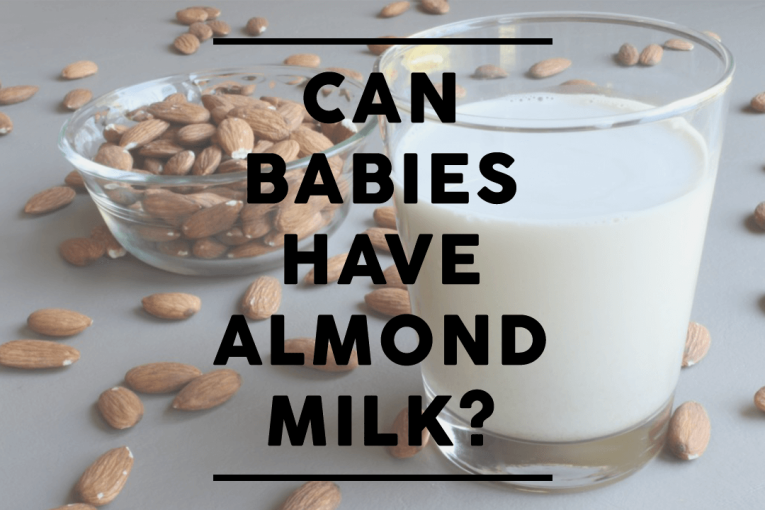Can Babies Have Almond Milk?
Recently I have a friendly trying to find alternative milk for her daughter as she is planning to wean from breast-feeding her baby. We discussed all sort of milks and one particular milk that interest me was almond milk. Today we are going to see what is the goodness that almond milk for a baby and whether can babies have almond milk.
Is It Safe To Give Baby Almond Milk?

If you ever wonder whether can babies have almond milk, the short answer is YES. Almond milk is apparently safe to give to your baby as long as they have celebrated their first year birthday.
Almond milk contains 25% of the daily vitamin D value, which helps the body of the baby to absorb calcium in higher levels. It is a great alternative to babies who are lactose intolerant and it does not taste like milk which sometime baby can dislike.
Almond milk contains 25% of the daily vitamin D value, which helps your baby to absorb calcium in higher levels. #AlmondMilkGoodness
When Can Babies Have Almond Milk?
Most pediatricians advise mothers to wait until the baby is 1 year old before giving almond milk to them. The reason is that almond milk would not provide sufficient nourishment to a growing child.
While almond milk can be rich in many type if nutrients but sometime it could be a bit too rich for a small child. Therefore it’s not recommended for any babies below 6 months old.
Why Choose Almond Milk?
Almond milk has been used as a substitute to soy or dairy milk due to its health benefits and few other reasons:
- Baby diagnosed with lactose intolerance can drink almond milk as alternative as this milk is naturally lactose-free.
- Baby with daily allergy cannot take milk regularly like any usual babies. A milk allergy is where a person has problems with the protein in the milk. In this case alternative milk like almond milk is the next option.
- Almond milk has been used as a substitute to milk since ages ago as people prefer it over the fresh milk from cows. It also has a longer shelf life compare to fresh cow milk.
Pacific Natural Organic Almond Milk (Pack of 12)
Looking to buy individual pack? Sure, go here.
Can Babies Have Almond Milk To Replace Regular Milk?
Although almond milk can serve as alternative milk but breast milk and cow milk are still the recommended milk for your baby given the rich nutrients they contain. It is a good source of vitamin A, calcium and Phosphorus, which are essential in building a child’s teeth and bones.
Almond Milk Benefits For Babies
This milk contains 25% of the daily value recommendation of vitamin D that assists the body of the baby to absorb calcium in higher levels. It also makes a good milk substitute for babies that are lactose intolerant, as it doesn’t taste like the conventional milk.
Almond milk contains a number of minerals and vitamins like vitamin E, magnesium, manganese, potassium, fiber, calcium, selenium and phosphorus. It has low calories and fat. It is also cholesterol, casein, lactose, gluten and saturated fats free.
Does Almond Milk Contain The Right Fat?
All fats were not created equal. It is right to conclude that almond milk does not offer sufficient nourishment to a growing child. Fat is essential for all persons including infants. Fat plays a role in the development of the brain and also to develop healthy bones in babies. Human and cow milks still the best milk to have the right fat for your baby as they grow.
Almond Milk And Allergies

Although almond milk is considered healthy, it is wise to avoid it until the baby celebrates its 2nd birthday due to the risk of nut allergies. Nuts are known to be among the most common foods that cause allergies.
Nut allergies involve certain reactions that include stomach cramps, itchy rashes, diarrhea, nausea, vomiting among others. They can also lead to a condition referred to as anaphylaxis, which is sudden, and with the potential to threaten life. This reaction usually makes the airways of an individual to swell and their blood pressure drops.
Nut allergies are mostly hereditary and not all babies have them. It is important to consult a pediatrician if you wish to start your baby on some foods that are allergy-causing.
If your family has history toward certain food allergies, it’s absolutely important to check if nut is one of them. While it’s possible that you as a parent might not have nut allergy but that does not mean your baby is the same. So, always practice cautious when first time introducing new food especially nutty stuff to your baby and that would include almond milk as well.
Different Between Lactose Intolerance And Milk Allergy
Most mothers look to almond milk as a substitute to regular milk due to their children having an allergy or intolerance.
Milk allergy refers to the situation where the child has a problem with the protein within the milk.
Lactose intolerance is where the child or person has an issue digesting the lactose found in milk, which is basically the sugar, found in milk.
- Allergy means that the child develops symptoms even from consuming little milk.
- Intolerance means that the child can still comfortably manage to consume some little milk.
Lactose intolerance is more common among the two and is synonymous with diarrhea, gas, nausea, bloating and abdominal pain symptoms.
It’s also worth to mention that some parents find that their child can tolerate some of the milk products but not all of them. For example, a child could take a cup of milk and remain fine but if the same child takes cheese or yogurt they develop symptoms.
How is Almond Milk Made?
Almond milk is made by mixing water and fine-grounded almonds. The mixture is then further filtered in order to remove the sediment and almond skins. The resultant almond milk is then easily stored in a shelf or in a refrigerator. However, it’s recommended to store in the refrigerator to avoid the almond milk becoming rancid or contaminated by bacteria or insects.
If you are interested to make your own almond milk, here is a video you ought to check it out….



